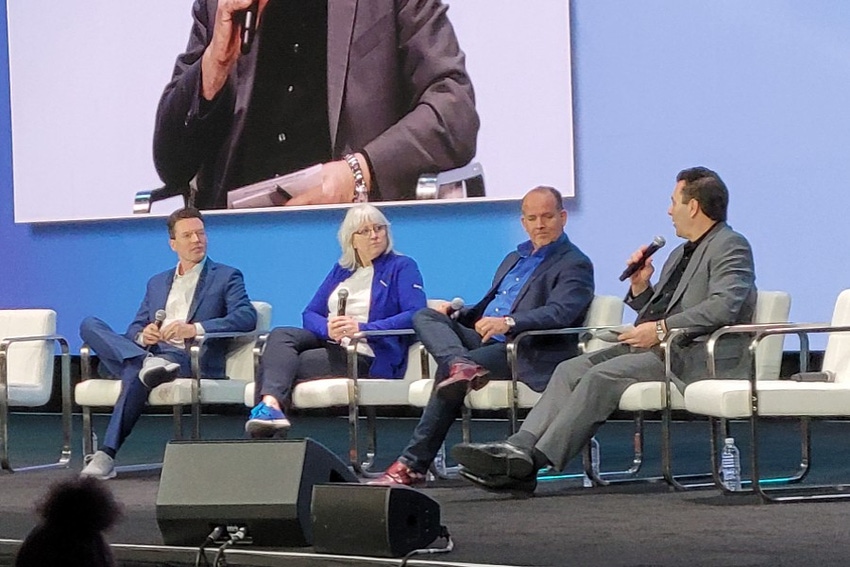The pandemic has led many customers to expect more from partners as they transform their businesses.
April 13, 2022

CHANNEL PARTNERS CONFERENCE & EXPO, LAS VEGAS — Customers faced with accelerating digital transformation and accomplishing it without compromising security have developed higher expectations from channel partners. The pandemic, which spurred or accelerated organizations’ shift to digital and hybrid work, has reshaped many customer-partner relationships.
Decision-makers at Alberici, RingCentral and Seminole Hard Rock Support Services on Tuesday shared what they now expect from partners. Speaking during a panel discussion at the Channel Partners Conference & Expo, the customers also warned which partner strategies won’t be successful.
Alberici, a large construction services company, was already undergoing a digital transformation effort when the pandemic began.
“The pandemic just accelerated it more,” said Aaron Geiger, Alberici’s CIO. “I think the vendor partners that we have are even more critical to making that digital transformation happen.”
To address the needs of remote workers during the outset of COVID-19, the CIO and CISO roles were combined at Seminole Hard Rock, Mike Novak, CISO explained.
“Both the CIO or CISO had to come together and learn how to operate the business, work with vendors that we hadn’t worked with before,” Novak said.
The pandemic forced RingCentral to change its procurement processes, which previously was drawn out, according to CISO Heather Hinton.
“The days of the three-to-six-month proof of concept with the multiple RFIs are gone,” Hinton said.
Hinton added: “We have to make decisions much faster, which means that I’m reliant on my channel partners to make sure that they’re giving me the right information. I need to trust that they know what they’re saying [and] that they’re giving me an accurate story, because that’s where they are now becoming critical for me to maintain the overall operational security.”
Meeting Customers’ Challenges
Most of the partners Seminole Hard Rock has used were proactive and able to address its needs, according to Novak. But many were not, he said.
“I probably had 30% new vendor onset because I needed to digitally transform where my current vendors didn’t have a solution and weren’t available obviously because of what was going on,” Novak said. “But we needed to innovate no matter what.”
RingCentral’s Hinton said she looks for partners “selling to solve the problem, not selling what was on the truck,” she said. To assure employees could work at home, being able to respond quickly also became a key requirement, Hinton added.
“With my incredibly, quickly changing workforce, I have to be able to move at the pace that accommodates them, so that they can then support my business,” she said. “And I need partners who will work in that same rate and pace.”
Knowing Your Customer
In the best of times, it’s never a good practice to not understand a customer’s business and requirements.
“You have to know your customer,” Hinton said. “If you don’t know your customer, how can you be a trusted partner for them?”
Novak agreed.
“What works best is the ones that come to the table saying, ‘I know you’re having this problem and here’s a potential solution for you,’” he said. “Because they know us, they know the business, they spent time with me, they did the research. In fact, some take time to teach me something about either my own role, or even my own business that maybe I didn’t know.”
Customer-Partner Advisory Councils
Among Alberici’s five most strategic partners Geiger said four have customer-partner advisory councils, and the company sits on three. Geiger said that creates a strong level of trust in the partnership.
“If you feel like they’re very transparent, you can have an honest conversation with them,” he said. “You can explain your wants and needs. And you want them to make money and you want to get a good price. If you come to a nice middle ground, you can have a long-term partnership.”
Hinton said also values those advisory councils.
“I love customer advisory boards because we get a view into the roadmap, the strategic thinking, you get to help influence and you get to hear from other customers,” she said.
Customers also value partners who are committed to keeping pace with their needs and seek long-term relationships, Geiger said.
“It’s the difference between a transactional relationship and a true partnership,” he said. “We’re all far less likely to end a relationship with a vendor where we have a true long term, trusted partnership. Whereas when it feels very transactional, it’s easier to look at other solutions.”
Want to contact the author directly about this story? Have ideas for a follow-up article? Email Jeffrey Schwartz or connect with him on LinkedIn. |
About the Author(s)
You May Also Like


